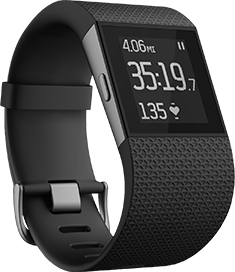 Fitbit, the top pure-play maker of fitness trackers, said today it sold $409 million in trackers in the quarter ending September, up 168 percent over the year previous, earning a profit of 24 cents per share. Pre-report consensus had expected earnings of 10 cents per share. For the current quarter, the company said it expected to earn 20 to 25 cents per share on sales of $620 million to $650 million; analysts had projected 20 cents per share on sales of $583 million. It sold twice as many trackers this third quarter as it did in 3Q 1014, and most of them were Charge, Charge HRs, and Surge — the top of the product line. No information was broken out in the press release about services revenue or abandonment/replacement rate.
Fitbit, the top pure-play maker of fitness trackers, said today it sold $409 million in trackers in the quarter ending September, up 168 percent over the year previous, earning a profit of 24 cents per share. Pre-report consensus had expected earnings of 10 cents per share. For the current quarter, the company said it expected to earn 20 to 25 cents per share on sales of $620 million to $650 million; analysts had projected 20 cents per share on sales of $583 million. It sold twice as many trackers this third quarter as it did in 3Q 1014, and most of them were Charge, Charge HRs, and Surge — the top of the product line. No information was broken out in the press release about services revenue or abandonment/replacement rate.
But what was particularly interesting was the announcement that Fitbit will put another round of shares on the market, potentially diluting the value of the 8 million shares already for sale. Those shares, you may recall, were priced at $20, hit the market in mid-June at $30, went to $40 within two weeks, peaked at $50 in the beginning of August before dipping back to $31 at Labor Day. Within two weeks, though, it was back at $40. For the last two weeks, the stock has been moving between $35 and $40. People who got in at the IPO have basically doubled their money or better.
Now, the company itself said it’s selling another 7 million shares — nearly doubling the initial float. Also, investors — the angels and VCs — have filed to sell as many as 17 million shares more. (Presumably, this is all Series A stock, which carries one vote; insiders hold Series B, which has 10 votes per share.) The stock immediately dropped 8 percent.
Also interesting: insiders usually are locked out of selling their stock for six months after an IPO; there is often — but hardly always — a drop in the stock price when the lock-out expires and shares hit the market. Fitbit announced that the lock-up of 10 percent of those insider’s 20 million shares and options — 2.3 million shares — will be released on Wednesday, November 4. The rest of the lock comes off on December 14. This secondary offering is happening before then.
At $40, the additional stock sale adds $280 million to Fitbit’s war chest — and put $680 million into the pockets of early investors.